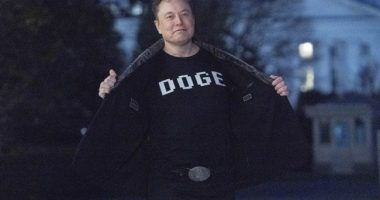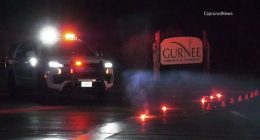A pretend pirate-ship captain with hearing damage from a dummy rifle fired next to his head is suing the Johnny Depp look-alike buccaneer who broadsided him at a beloved annual Milford, Conn., event.
Walter Micks, 61, was playing his part at Pirate Day when volunteer swashbuckler Tucker Reynolds, 52, “walked over . . . and shot off a black powder rifle directly next to the plaintiff’s ear,” injuring him with an “excessively explosive sound,” according to the lawsuit filed in Connecticut Superior Court.
Two years later, Micks still has hearing loss and tinnitus — ringing in the ears.
“Everybody thinks it’s a joke — it’s not a joke,” said Micks’ lawyer, Edmund Collier.
The dummy weapon “looks like a musket,” he said..
“It does not fire a projectile. The sound that emanates from this weapon is a loud bang. Everyone else goes home fine from Pirate Day, and Walter has to live with this every day for the rest of his life. This is something that’s debilitating, and it’s a big deal.”
According to local lore, Captain William Kidd in 1699 passed through Milford, stopping to bury stolen treasure on tiny Charles Island, now a nature preserve. Milford has marked the occasion with a festive, family-friendly day for some 20 years.

After a breakfast of “pancakes with pirates,” the day unfolds with a treasure hunt, kiddie events and the arrival of Captain Kidd — played by radio personality Brian Smith — in Milford Harbor.
The event is “Milford’s favorite swashbuckling tradition,” according to its sponsor, the Downtown Milford Business Association, also named in the suit. Reps of the group declined to comment.
It was no fun for Micks. The suit states he also suffers from sleep loss, fatigue and other quality-of-life issues.
“Our claims against Tucker are negligence,” Collier said. “We aren’t trying to engender any ill will toward the Pirate Day folks.” Micks — wearing a tricorne hat and a tie-dye shirt — was a volunteer “doing something nice for the city, and came away with this injury through no fault of his own.”

Reynolds’ lawyer, Thomas Cotter, said the volunteer buccaneer, with his braided beard and red bandanna, “is the kind of guy who wants to give back to his community.”
“This event is well-attended and everybody is a volunteer, along with the plaintiff and three other pirates who were firing muskets,” Cotter said. “Tucker is an artist by trade and he looks like Johnny Depp in the pictures.”
Read Related Also: What an average person's day looks like – so does it sound familiar to YOU?
Reynolds also has years of experience handling such weapons, Cotter said.
“Anyone who uses a gunpowder-loaded musket has to know what they’re doing. Anyone who is experienced with guns knows to wear proper earplugs, and the captain of the ship should have worn earplugs, as well,” Cotter said.

But Collier countered that Micks, who worked in construction, was wearing earplugs — and since Reynolds was wearing them too, it “demonstrates that he is aware that discharges of these muskets can potentially lead to hearing damage.”
“He is a fiend about ear protection,” Collier argued.
Depending on the intensity of a noise and its proximity to a person’s ear, “earplugs are not always enough,” said Michael Maholchic, president of the nonprofit Hyperacusis Research, which funds research into noise-induced pain.
“Unless they are in the military, many people are never exposed to the extreme noise of blasts or gunshots at such close range,” he said. “It’s tragic when a noise injury occurs at a planned recreational event. A severe acoustic injury affects every aspect of a person’s life. Coping strategies can help, but there is currently no treatment or cure.”

Ear damage from such an impulse noise, even a single blast, can be “immediate and permanent,” harming both sensory cells and nerve fibers, according to M. Charles Liberman, a professor of otolaryngology at Harvard Medical School.
“It’s a classic scenario,” he said. “We’ve had many people come to Mass Eye and Ear saying, ‘I was fine and then a firecracker went off next to my ear and I have ringing and it won’t go away.’ The ringing is very distressing.”
Tinnitus remains a medical mystery.
“The hypothesis is that loss of sensory information going to the brain causes tinnitus,” Liberman said. “Paradoxically, with the loss of sensory input, neural activity becomes hyperactive.”

The Milford case is similar to a 2015 Boston case in which a passerby suffered severe hearing damage after ceremonial artillery fire at a June Day re-enactment on Boston Common.
“No one takes noise and the effect of acoustic trauma seriously,” said lawyer Scott Charnas, who won a settlement in that case.
“You would think someone in that position — firing a musket — would take precautions and keep a reasonable distance,” Charnas said. “Nobody is trying to be a killjoy and saying you can’t re-create pirate days, but people must be warned that the sound may reach unsafe levels.”









